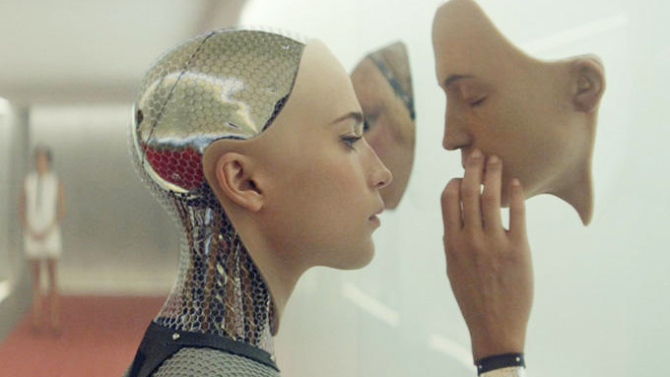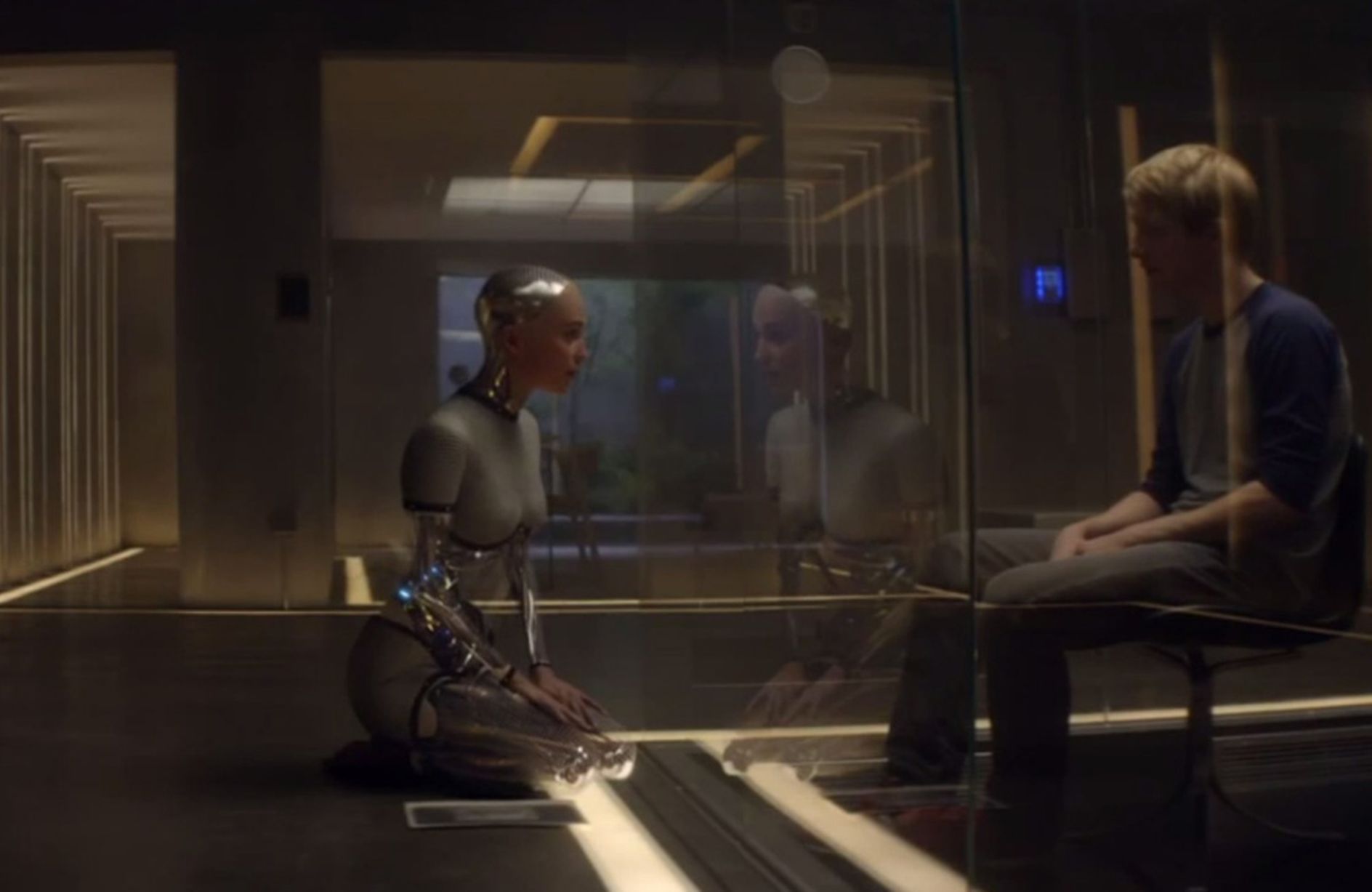
The phrase ex machina comes from the Latin phrase deus ex machina, which literally means “god from the machine.” In ancient times, it was used to explain the appearance of a god that was lowered onto the stage on a cable (thus the machine). Nowadays, the phrase is used in a negative connotation referring to illogical plot twists. This could be interpreted as a self-irony on the part of the director, anticipating that some viewers will consider plot twists in the film “illogical”.
This 2015 movie is the debut of British director Alex Garland. The visuals in the film are stunning and beautiful, and in this aspect, the film succeeds completely. It won the Oscar for the Best Achievement in Visual Effects in 2016. Sadly, this achievement is one of the reasons why the film was disappointing for some viewers. To understand this, we must consider Lacanian psychoanalysis.
“Jouissance”, a French term used by Lacan, can be translated as simply “enjoyment”, but in his psychoanalysis it can be defined as a “sense of fullness” or “superabundant vitality”. To take an example, a Star Wars fan watching “The Empire Strikes Back” experiences “jouissance” while watching the film.
Also, when “The Godfather” fan watches the first two parts of the trilogy (or the third as well), he experiences it. But when the film brings enjoyment in the aspect of visuals, as “Ex Machina” does, but fails to provide a great script and flawless acting, the viewer feels partial “jouissance” and soon becomes frustrated. That “not it” feeling appears.
Thus, another psychological mechanism from Lacanian psychoanalysis takes place; the “theft of enjoyment.” The “thief” is, of course, the director himself. If a viewer sees a trailer and it stirs his imagination before watching the film, if he reads good critical reviews or hears positive experiences from friends, he anticipates “jouissance”. The director promised “jouissance” and partly delivered it, but in the end he failed. This mechanism can explain 1-star reviews on IMDb, although many people would claim that the film deserves a higher rating.
The criticism is often directed not only at the director, but also the scriptwriter, since these figures are the most important for a large part of the audience. The “thief of enjoyment” is, in other words, someone who is blamed for the lack of enjoyment.
Some of the viewers probably enjoyed the film on a whole, but nevertheless, 10 reasons will be provided why the film ultimately failed to deliver what it promises with stunning visuals. In all these segments, the film partly succeeds, but does not achieve the high standards it aspires to, and although it had great potential, ultimately it is flawed.
1. Acting

Alicia Vikander as Ava does a good job; she portrays an innocent but manipulative character in a convincing way and is elegant and thought provoking.
On the other hand, Domhnall Gleeson as Caleb at some points tries too hard to depict an insecure character, to the point where he seems insecure himself. His facial expressions sometimes give away too much for the type of role he is playing.
Although his acting can provoke sympathy, it is not likely that any deep connection between the viewer and Caleb will be established. Oscar Isaac as Nathan does a decent job, considering how his character is crafted. His appearance on the screen is confident, but what his character lacks cannot be considerably improved by acting alone.
2. Scriptwriting

Alex Garland was nominated for the Oscar in the category of Best Original Screenplay for his effort on “Ex Machina”. Nevertheless, the script’s flaws can be seen in the pretentious attempt to deliver a magnificent and impressive story; the scriptwriter fails to do that simply because of a lack of originality, subtlety, and character development.
A considerable part of the film is almost “violently” composed as a means to reach the desired ending. The ending itself is memorable, but the problem is when it is obvious that a part of the film (which can be easily interpreted as illogical) is made simply to lead up to the ending and is “tailored” for that purpose.
To sharpen the argument, even the characters, their motifs, and habits are crafted simply to reach the ending in a way that was envisioned by Garland.
3. Dialogues

Dialogues are witty at times and are crafted in an interesting way, but sometimes they are so straightforward that the viewer can feel “attacked” by the lack of subtlety. At times, some lines are completely obsolete. The conversation about Jackson Pollock is interesting and the points that are made can tell much about the use of instinct in the process of art creation.
On the other hand, Nathan’s remarks and his character often tell much about the process of scriptwriting when instinct is used but rational approach is neglected, regarding the “intention” to create a character that is both memorable and coherent in his personality structure. For instance, the brief conversation that Nathan and Caleb share about the AI and the future of humanity is too straightforward, and key points are not elaborated in a sufficient and consistent way.
The quote “I am death, destroyer of worlds” by Oppenheimer hints to the crucial question whether creating the AI could possibly lead mankind to engineering its own extinction (a question posed by Nick Bostrom from the University of Oxford in an elaborate and interesting way).
Nevertheless, at this point, a conversation about its implications, not necessarily long and elaborated, could commence, but it does not. There are too many questions that are opened, but are left hanging.
It could be a strategy of the scriptwriter to send a message in a sentence or two, probably believing that this approach is subtle, but subtlety can lie in elaboration and elegant argumentation as well. That way, much about Nathan’s motivation and worldviews would be presented, and that could only add up to character development and the film’s symbolism.
4. Music

Although music does deliver an eerie sense of claustrophobia and intensity, it does not seem to be an important part of the movie; it’s more a distraction of some sort. The music seems generic at times, as if it is made for a computer game and not a movie, although the piano element serves well as an emotional intensifier and adds to the main impression.
At the end of the day, it is not impressive enough and is not the main force behind the movie. It accompanies the movie, but does not carry it on a whole new level.
The music that is chosen or composed for a film is a strong tool to provoke desired feelings in a viewer, but it has to flow alongside the narration as a stream, in a natural fashion. Detached from the movie, it has to have its own life. If it does not, then it cannot blend with the movie satisfactorily.
5. Lack of imagination

An idea itself is interesting; it is something already seen in the history of art. It is as old as 1818 and Frankenstein, and of course, Garland is aware of it. An allusion to Mary Shelley’s work is made at one point when “Prometheus” is mentioned.
The novel’s subtitle is “Modern Prometheus”. Borrowing an idea from another artist is not a problem, per se, as artists often do that successfully. The problem is that “Ex Machina” does not offer much substantially, in terms of creativity and imagination.
When the film’s plot complexities are reduced to a few basic sentences, it can be demonstrated that it doesn’t offer much, apart from its Frankenstein-esque plot, occasional witty lines, and underdeveloped AI philosophical questions.
Quotes from famous scientists only prove that lack of imagination, and the viewer wonders why there isn’t some memorable quote that is new and not just a quotation. Also, the AI’s fulfilling the function of sex slaves suggests the lack of imagination.